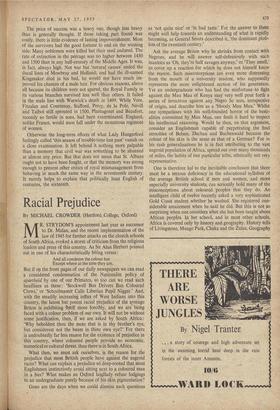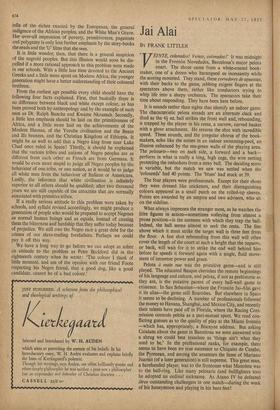Racial Prejudice
BY MICHAEL CROWDER (Hertford College, Oxford) MR. STRYDOM'S appointment last year as successor to Dr. Malan, and the recent implementation of the law of 1945 for further attacks on the church schools of South,Africa, evoked a storm of criticism from the religious leaders and press of this country. As Sir Alan Herbert pointed out in one of his characteristically biting verses :
And all condemn the colour bar
Except where at the time they arc.
But if on the front pages of our daily newspapers we can read a considered condemnation of the Nationalitt policy of apartheid by one, of our Primates, so too can we read such headlines as these: 'Stockwell Bus Drivers Ban Coloured Crews,' or 'Schoolmaster Calls Liberian Pupil Nigger.' And, with the steadily increasing influx of West Indians into this country, the latent but potent racial prejudice of the average Briton is exhibiting Itself more forcibly, and we are being faced with a colour problem of our own. It will not be without some justification, then, if we are asked by South Africa : 'Why beholdest thou the mote that is in thy brother's eye, but considerest not the beam in thine own eye?' For there is undoubtedly far less reason for the existence of prejudice in this' country, where coloured people provide no economic, numerical or cultural threat, than there is in South Africa.
What then, we must ask ourselves, is the reason for the prejudice that most British people have against the negroid races? What can explain a prejudice so deep-rooted that most Englishmen instinctively avoid sitting next to a coloured man in a bus? What makes an Oxford landlady refuse lodgings to an undergraduate purely because of his skin pigmentation?
Gone are the days when we could dismiss such questions as 'not quite nice' or 'in bad taste.' For the answer to them might well help towards an understanding of what is rapidly becoming, as General Smuts described it, 'the dominant prob- lem of the twentieth century.'
Ask the average Briton why he shrinks from contact with Negroes, and he will answer self-defensively with such inanities as 'Oh, they're half savages anyway,' or 'They smell,' to cover up a reaction for which he does not himself know the reason. Such misconceptions are even more distressing from the mouth of a university student, who supposedly represents the more enlightened section of his generation. Yet an undergraduate who has had the misfortune to fight against the Mau Mau of Kenya may' very well pour forth a series of invectives against any Negro he sees, irrespective of origin, and describe him as a 'bloody Mau Mau.' Whilst one sympathises with his well-founded horror of the besti- alities committed by Mau Mau,, one finds it hard to respect his intellectual reasoning. Would he then, on that argument, consider an Englishman capable of perpetrating the foul atrocities of Belsen, Dachau and Buchenwald because the colour of his skin is the same as that of a German? For in his rash generalisations he is in fact attributing to the vast negroid population of Africa, spread out over many thousands of miles, the 'habits of one particular tribe, ethnically not very representative.
One is therefore led to the inevitable conclusion that there must be a serious deficiency in the educational syllabus of the average British school if men and women, and more especially university students, can seriously hold many of the misconceptions about coloured peoples that they do. An intelligent child of twelve recently asked a very sophisticated Gold Coast' student whether he washed. She registered con- siderable amazement when he said he did. But this is not so surprising when one considers what she has been taught about African peoples. In her school, and in most other schools, Africa is covered only by history and geography. History tells of Livingstone, Mungo Park, Chaka and the Zulus. Geography tells of the riches exacted by the Europeans, the general indigence of the African peoples, and the White Man's Grave. Her over-all impression of poverty, primitiveness, paganism and polygamy is only lent further emphasis by the story-books she reads and the `I.J' films that she sees.
It is little wonder, then, that there is a general suspicion of the negroid peoples. But this illusion would soon be dis- pelled if a more rational approach to this problem were made in our schools. With a little less time devoted to the Ancient Greeks and a little more spent on Modern Africa, the younger generation might have a better understanding of their coloured brethren.
From the earliest age possible every child should have the following four facts explained. First, that basically there is no difference between black and white except colour, as has been proved both by anthropology and by the example of such men as Dr. Ralph Bunche and Kwame Nkrumah. Secondly, a little less emphasis should be laid on the primitiveness of Africa, and a little more laid on the achievements of the Moslem Hausas, of the Yoruba civilisation and the Benin and Ife. bronzes, and the Christian Kingdom of Ethiopia. It might be as well to add that a Negro king from near Lake Chad once ruled in Spain ! Thirdly, it should be explained that the various tribes and nations of Negro peoples are as different from each other as French arc from Germans. It would be even more stupid to judge all 'Negro peoples by the behaviour of one tribe, or one nation, as it would be to judge all white men from the behaviour of Italians or Americans. Lastly, the inference that white civilisation is infinitely superior to all others should be qualified: after two thousand years we are still capable of the atrocities that are normally associated with primitive tribes: If a really serious attitude to this problem were taken by schools, and syllabi revised accordingly, we might produce a generation of people who would be prepared to accept Negroes as normal human beings and as equals, instead of causing them the bitterness and hardship that they suffer today because of prejudice. We still owe the Negro race a great debt for the crimes of our slave-trading forefathers. Perhaps we could pay it off this way.



































 Previous page
Previous page